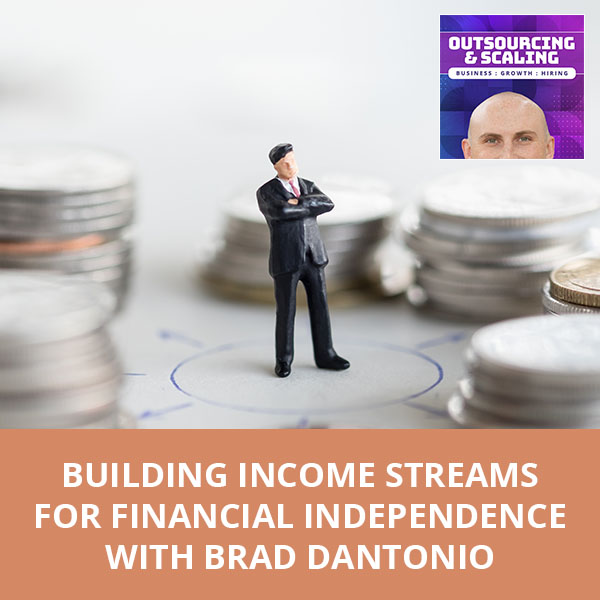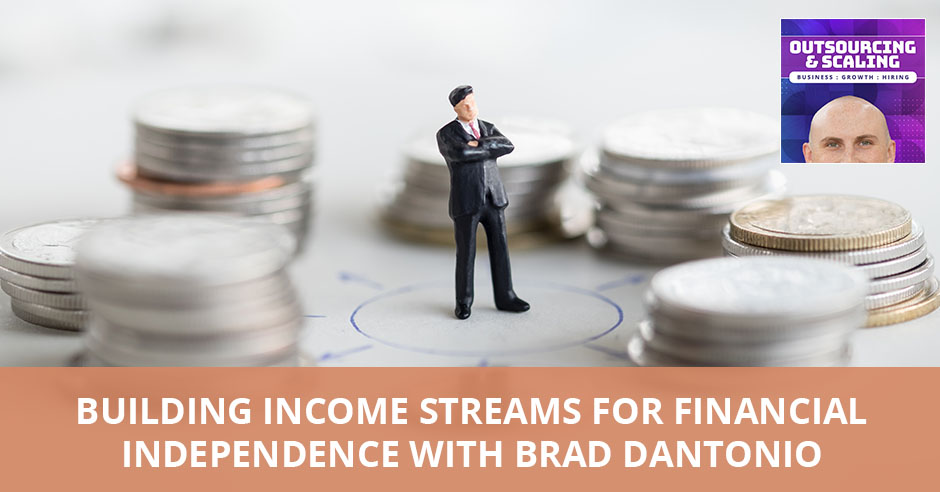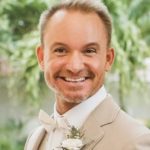


It’s hard to imagine being retired at 50, or even younger than that. In this episode, Brad Dantonio shares how he achieved financial independence which allowed him to retire at the age of 34. He says that despite his increasing income, he did not experience inflation in his lifestyle. This allowed him to have more cashflow directed towards investments. He also stressed the importance of emotional intelligence in acquiring virtual assistants. Brad started his podcast, Fire Coaching, as a way to teach people financial independence through investment in real estate.
—
Listen to the podcast here:
[smart_track_player url=”https://www.podetize.com/statsapi/www.podetize.com/wp-content/uploads/fileuploads/11-5b145ef137b51b3d1af0633e9305c43d/11/2019/1ee20b41dd1a8034a391d8b434c7d930.mp3″ title=”Building Income Streams for Financial Independence With Brad Dantonio” ]
Download the audio file here.
Building Income Streams for Financial Independence With Brad Dantonio
My guest is Brad Dantonio. Brad, how are you doing?
I’m good. How are you?
I’m doing great. I’m excited to talk to you. For those who don’t know, Brad lives in Houston, Texas and he retired in 2015 at the age of 34. That’s right, he is retired. He is traveling the world with his bride. In 2003, he began creating multiple income streams which enabled him to buy his freedom from mentoring work after twelve years in the workforce. He has the Man Overseas blog and podcast which I’ve been on. It’s a project born out of the desire to share what he has learned. He writes about self-development, real estate investing and other life lessons, glean through the years of studying and observation. This other retirement gig is the one-on-one Fire Coaching only Monday afternoons for those who wish to achieve financial independence primarily through real estate investing, he is also a FreeeUp client. First, I wanted to take a gigantic step back. I know you were in the workforce but before that, what were you like growing up? Were you a rebel or were you a straight-A student? Did you know that you wanted to be an entrepreneur at some point?
It’s a good place to start. On November 7, 1991, it was the day that Magic Johnson retired from basketball. That’s why I remember the day. My dad walked in and said that he was leaving. It came as a shock to us because I never saw my parents fight or anything. He moved out of state and started a new family. At that point, I knew he wasn’t coming back. My mom was not well. I did some things that I wouldn’t have done had I not going through that difficult period. To give you an example, my first experience with entrepreneurship was buying boxes of basketball cards. I would save the money that my grandma and my aunts gave me and I would buy a box of basketball cards for $40.
I would take the packs to school and sell them for $2 a pack. There were 36 packs in the box. I would make $32 on each box, which is an 80% return. I was only thirteen years old at this point. I would reinvest the money and it took a lot of discipline to not open the packs. I wanted the good cards that were in there too. That’s why I get into it because I like basketball cards. That was my first experience with business. When I got into high school, my best friend and I started a business where we would sell keg-cups at the high school party. We would make a killing on that doing that and reinvested into the keg for the next weekend. I was a bit of a rebel. After college, I went into a commission-only job. There was an entrepreneurial street there too.
I feel the commission-only job is what separates the men from boys. That’s when you figure out whether you can make it. A lot of times, that leads into being an entrepreneur. What did you learn at that job?

I learned how to effectively manage my time. I got hyper-efficient and learned to maximize each hour of the day. I was a guy that would wake up in the morning and brush my teeth while I was using the restroom. From the minute I woke up, I was trying to increase productivity. I was a freak about budgets at that age to where I would write every expense down. As an entrepreneur, you need to be able to effectively manage money and especially your personal household budget. My income started doubling while my expenses stayed low. I didn’t go much higher in terms of lifestyle than what I was living as a college kid. That enabled me to save and invest in other ways. That’s how I created multiple streams of income. I learned all sorts of things from that first experience that I was able to carry into other jobs and businesses as I got older.
You did that one job for twelve years or did you jump around?
I stayed. I was working in real estate full-time for about four years. I didn’t know what day of the week it was because I was working so much. This tends to be a common theme in sales. People who are selling real estate think that people in pharmaceuticals are making more money. People in pharmaceuticals think that people in software making more money. I was chasing money at the same time that I wanted to know what the day of the week it was. I found out that people in software work Monday through Friday and I was like, “That’s amazing. I can make as much money working in software and only work five days a week.”
I decided that I’m too high energy for one job. I played college baseball. I was used to balancing baseball in school. I retained my real estate license while working this W2 job in software and took all of the commissions from both jobs and invested them in real estate. Once I got into software, I was in technology. I had access to not insider information, but I could see what businesses we’re using to operate. I would make little investments and things like that and ultimately, those little investments of both time and money that enabled me to buy all of the time and wealth that I have now.
You’re retired by 34 and you had multiple income streams. How many different income streams are we talking?
It depends on how you want to look at it. I still allow all of my equity investments to grow on the side while living off of passive real estate income. Are you talking passive income streams? I had different sources of earned income, but in terms of the passive income, all of that was compounding on the side because I was so focused on getting my earned income up.
As an entrepreneur, you need to effectively manage money and especially your personal household budget.
The overall structure. You set it up with multiple revenue streams, you are able to retire. I’m sure the people reading are thinking, “How can I set up something similar if I want to?” If you can walk us through how you structured it.
There were books that impacted me when I got up to college, Rich Dad Poor Dad, The Richest Man In Babylon, The Millionaire Mind, The Millionaire Next Door. All these books informed how I went about building income streams and disciplining myself with money. I would take all of my commissions and put them into a high interest savings account. By this time, you could search online to find the highest interest rate and I would dump the money into real estate. I would pay cash. I was buying between 2007 and 2013. I’ve bought about five rental properties in cash because that time period coincided with the downturn in the economy and in the housing market. Houses that we’re selling for $140,000 in 2005, in 2010, we’re selling for about $65, 000 or $70, 000.
As my income went up, I didn’t increase my lifestyle. I didn’t suffer from lifestyle inflation to where I could take that money and invest it into real estate. I wasn’t even spending all of my salary. I was able to invest a little bit more money into technology investments. That paid dividends and interest, but it’s not like I would spin that money, I would just reinvest it. It’s tough to say how many income streams I have, but the primary income stream that led to my financial freedom was the real estate investments. Those five properties that I paid cash for that led to my financial independence to retire early.
It reminds of Mr. Money Mustache. I don’t know if you’ve seen his blog online, but that’s what he preaches. Diversifying the money, but also not increasing the lifestyle and figuring out a way to retire early by saving. Was it just you? Did you have a partner? Did you build a team? Walk us through the structure there.
It was all me. Since I retained my real estate license, I was able to set myself up in the multiple listing service to receive properties when they hit the market. I tried to get partners in 2009, 2010. I would go to my soccer colleagues and say, “Do you want to put $40,000 or go half on a house with me? This is how much income it would provide, about $400 net.” People aren’t long-term thinkers the way that I was. I thought these are properties that I’m going to hold for 60 years and pass to my heir someday. Meanwhile, they are trying to make profits in a year or two or a 10% guarantee. The income stream isn’t good enough for them. They want 20% and 30%. The other people that I would ask had Louis Vuitton bags and stuff. They didn’t have the money available to be able to invest $40,000. I would save as much money as I could and invest it and have to go alone because I couldn’t find partners.
What are you using virtual assistants for? I mentioned you’re a FreeUp client. Give people an idea of what tasks you are giving them.

My wife and I were in Prague and at the time, I’ve said to my her that I needed to work on show notes for my own podcast. If she wanted to go and see the castle, she could go do that. She said, “Why don’t you give it to your virtual assistant?” I was able to do that. That was the first time that I had completely outsourced the task. It freed us up for six hours to be able to do what it is that we wanted to do which is enjoy the beautiful day in Prague.
You’re using them for your podcast. Tell the audience a little bit more about your podcast. You asked me before this why did I start the podcast and how is it going. As someone who has been doing it for a little while, I love to hear what was your mentality behind it.
I was a guest on a podcast called BiggerPockets which has maybe 100 million downloads or something. As a result of that guest appearance, I was inundated with questions. I decided instead of replying to each one, I would scale the answers by starting a podcast. That’s what started it. The theme is the pursuit of financial independence by investing primarily in yourself. We deviate from that a little bit and talk about relationships and other things that I find interesting. I’m a big reader and I read a ton of books. There is always stuff to talk about especially I have travel story that I tell. It helps people to get to the next level because I feel like what I’ve been able to do in this life has been somewhat uncanny. I’ve been to 54 countries since I “retired” in 2015. I want others to experience this too. I’m in Prague doing tour groups around Central and Eastern Europe. Someone with the fire inside to achieve extreme early retirement is not going to be content to sit on a beach all day. One of the things that I do is tour groups around Central and Eastern Europe. That’s why we’re here. We’re living in Prague in Vienna for a couple of months and we’ll move on to Thailand. My wife and I pretty much travel full-time.
You mentioned you read a lot of books, I’m sure you’ve read some business books on hiring. Are there any books on hiring that you would recommend or any lessons that you’ve learned that other people can apply?
I would say any books on emotional intelligence are good. That’s an underrated aspect of business. If you have the capacity to not only control your own emotions, but influence other’s emotions. That is important because you’re always trying to create the optimal solution. When I was in sales, we’re basically problem solvers and educators. If you are able to relate to someone, you going to be more effective in doing that. I know Daniel Goleman wrote a book called Emotional Intelligence and there since has been an Emotional Intelligence 2.0. I would start there.
Now that you are “retired” and one of your goals is to travel the world, you’ve got the podcast, you’ve got the real estate on the side. What’s next? Are there any other projects that you are working on?
Once you get money out of the way, you can do some amazing things with your life.
I don’t have that much time. I have the blog and the podcast. I have the personal coaching that I do on Mondays which also came as a result of people asking questions. I thought I’ve got to put a premium on my time. On Monday afternoons, I will charge people to do one-on-one consulting or coaching. I coach them to achieve financial independence primarily through real estate investing. In terms of goals, I was on a podcast FIRE Drill and they asked me, “What is your wildest dream?” I said, “My wildest dream is I told my wife that since I was not going to go back to a W2 job, which I had sizable income because I was one of the top salespeople. They say 20% of your salesforce is going to bring in 80% of the revenue or whatever. When you can hack it, you can make a lot of money, but you have to be able to face rejection and all of that.
To answer your question, I told my wife that the biggest consequence of that would be instead of five or six kids, we could probably only have one or two. She comes from a huge family. Her mom has fourteen siblings, her dad has ten or nine. She wants a big family and I told her that, “In a perfect world, my wildest dream would be that she could have as many kids as she wants.” We could have a traveling nanny and be able to fulfill all of our philanthropic ambitions while building something that extends my influence and impacts to more people. I feel like at this point in my life, I want to give back because I’ve been extremely blessed.
I told you about the tough time that I went through as a kid. That did something to me. Being able to outsource the way that I am doing where I can outsource a lot of the work in order to accomplish my goals, that enables me to do some incredible things. One of my early mentors said, “Once you get money out of the way. You can do some amazing things with your life” I have a special place in my heart for kids who are helpless because I’ve been that helpless kid. I went to Africa and taught orphan kids who were born with HIV. I’m the luckiest guy in the world to be able to help the least fortunate kids in the world. You probably heard people on their deathbed regret working too much. On my deathbed, I’m going to think back through my life and how was I of service to others. To me, that’s one of the ultimate things that you could do is find the least fortunate people on earth and teach them to reap. What is more fulfilling than that?
If my days were to end tomorrow, there are some things that I’ve been able to do which are amazing. In this world, the cyber economy that we are living in is enabling that because I can call my girl in the Philippines and say, “For the next week, I need you to do X, Y, Z and I am going to be able to fulfill this philanthropic ambitions.” That’s a long way to answer your question, but you can structure your affairs nowadays to where you can live a life that is unprecedented. I’m trying to optimize and take full advantage. Thanks to your company and what you offer, I’m able to do that.
I appreciate it. What are the biggest mistakes that you see entrepreneurs make?
Entrepreneurs don’t take enough time to think. Reflection is something that is becoming a thing of the past. Boredom no longer exists because in every idle moment people are reaching for their phones. Entrepreneurs need to realize how important their time is. They can make better use of their time by sharpening the saw so to speak. That’s taking time out of your days and scheduling time to think. Some people think better when they are going for a walk. Some people think better when they are in the shower. Some people think better sitting on the couch. Don’t feel like you always need to be doing something. Take some time to read. Take some time to think. Reading is not Twitter, reading is sitting down with a book and absorbing its contents so that you can be more effective.

That’s great advice. I got back from Croatia, Baby Bathwater Island with high-level entrepreneurs. I was talking to them. I want to learn from them. Most of them are way more successful than I am and that was my biggest takeaway. They are like, “Your calendar is too packed. You’ve got to block more time for you, for reading, for reflections, for brainstorming.” That’s what I’ve been talking with my business partner Connor who lives in Denver and how we can restructure it. We’re still doing the podcast, the projects and all that stuff, but we also have time to ourselves for that planning and brainstorming. What other advice do you have for the audience? You’ve done a lot. You are able to retire at a young age. You got a blog, a podcast and you do coaching. Is there anything else that we didn’t touch upon that you think would bring a lot of value to the audience?
If you take a timeout to do plenty, that will also help because many people are not setting goals. We know how reticular activating systems work. Once you have something written down, you are going to start noticing things that you didn’t notice before. It’s like pregnant women, you see pregnant women everywhere. When you buy a red Ferrari, you start to see red Ferraris everywhere. That all is part of goal setting and whether you are a systems person or a goals person. There is an argument that I see on Twitter all the time between systems-oriented or goals-oriented. I was setting major goals when I was 22 and 23.
I started on December 31st of every year setting 90 minutes aside and reflecting on the past year, go over who I met, what I’ve learned, how I could harness what I learned and who I met to benefit me for the following year. That’s thinking, planning, and reflecting. I don’t think people are doing that nowadays. We’re all, and I’m guilty too, addicted to our phones. If I had one piece of advice for your audience, it would be to take some time out and think about what you want your life to be, do some planning, do some reflecting, see how you can get better next year than you were this past year.
Brad, this has been great. Where can people find out more about you and what you are most excited about?
I’m most excited about the clients that are coming here because I’m going to show them Prague, Vienna, Budapest and Bratislava. This is such a beautiful part of the world. You can find me on Twitter and Instagram. I’m @Man_Overseas. The other thing I’m excited about is my podcast. It’s not that old. I’ve had some bigtime guest, you being one of them. They are people who are doing big things with their life. I enjoy talking to people who are thinkers that are doing big things with their life and want to be of service to other people.
Thanks so much for coming on. I appreciate it.
Thank you.
Important Links:
- Brad Dantonio
- ManOverseas
- Fire Coaching
- FreeeUp
- Rich Dad Poor Dad
- The Richest Man In Babylon
- The Millionaire Mind
- The Millionaire Next Door
- Mr. Money Mustache
- BiggerPockets – Brad’s Episode
- FIRE Drill – Brad’s Episode
- Baby Bathwater
- Emotional Intelligence
- Emotional Intelligence 2.0
- Twitter – Brad’s Twitter
- @Man_Overseas – Brad’s Instagram
About Brad Dantonio
 Brad Dantonio 38 yo, Houston, TX, “retired” in 2015 at age 34; now traveling the world with new bride (in Prague on July 5).
Brad Dantonio 38 yo, Houston, TX, “retired” in 2015 at age 34; now traveling the world with new bride (in Prague on July 5).
How I “retired”: In 2003, I began creating multiple income streams, which enabled me to buy my freedom from mandatory work after 12 years in the workforce.
ManOverseas blog & podcast is a project borne out of a desire to share what I’ve learned. I write about self-development, real estate investing, and other life lessons gleaned through years of study & observation. My other “retirement” gig is one-on-one FIRE coaching (only on Monday afternoons) for those who wish to achieve financial independence, primarily through real estate investing.
